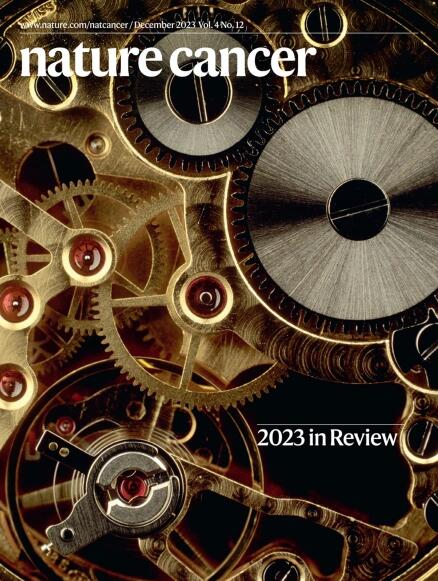ETV7 通过改变 CD8+ T 细胞的命运,使其走向衰竭,从而限制了 CD8+ T 细胞的抗病毒和抗肿瘤功效。
IF 23.5
1区 医学
Q1 ONCOLOGY
引用次数: 0
摘要
终末衰竭是抗肿瘤免疫的重要障碍。通过整合和分析单细胞rna测序和单细胞转座酶可及染色质测序数据,我们发现ETS变体7 (ETV7)对于决定肿瘤中CD8+ T细胞的命运是不可或缺的。ETV7的引入导致T细胞从记忆分化到最终衰竭,限制了雄性小鼠的抗病毒和抗肿瘤功效。从机制上讲,ETV7通过与特定的记忆基因和衰竭基因结合,并在功能上扭曲这些转录程序,使其向衰竭方向发展,从而起到中心转录节点的作用。在临床上,ETV7的表达与各种人类癌症的进展和对免疫检查点阻断的反应呈负相关。ETV7缺失可显著增强CD8+ T细胞和工程嵌合抗原受体T细胞在实体瘤中的抗肿瘤作用。因此,这些发现证明了ETV7在驱动CD8+ T细胞末端衰竭中的决定性作用,并揭示了ETV7可能是提高癌症免疫治疗疗效的有希望的靶点和生物标志物。本文章由计算机程序翻译,如有差异,请以英文原文为准。

ETV7 limits the antiviral and antitumor efficacy of CD8+ T cells by diverting their fate toward exhaustion
Terminal exhaustion is a critical barrier to antitumor immunity. By integrating and analyzing single-cell RNA-sequencing and single-cell assay for transposase-accessible chromatin with sequencing data, we found that ETS variant 7 (ETV7) is indispensable for determining CD8+ T cell fate in tumors. ETV7 introduction drives T cell differentiation from memory to terminal exhaustion, limiting antiviral and antitumor efficacy in male mice. Mechanistically, ETV7 acts as a central transcriptional node by binding to specific memory genes and exhaustion genes and functionally skewing these transcriptional programs toward exhaustion. Clinically, ETV7 expression is negatively correlated with progression and responsiveness to immune checkpoint blockade in various human cancers. ETV7 depletion strongly enhances the antitumor efficacy of CD8+ T cells and engineered chimeric antigen receptor T cells in solid tumors. Thus, these findings demonstrate a decisive role for ETV7 in driving CD8+ T cell terminal exhaustion and reveal that ETV7 may be a promising target and biomarker for improving the efficacy of cancer immunotherapy. Jiang and colleagues identify ETV7 as a transcriptional node that skews CD8+ T cell transcriptional profiles toward exhaustion, consequently limiting antiviral and antitumor efficacy, and show that it can be targeted in CAR T cells to enhance efficacy.
求助全文
通过发布文献求助,成功后即可免费获取论文全文。
去求助
来源期刊

Nature cancer
Medicine-Oncology
CiteScore
31.10
自引率
1.80%
发文量
129
期刊介绍:
Cancer is a devastating disease responsible for millions of deaths worldwide. However, many of these deaths could be prevented with improved prevention and treatment strategies. To achieve this, it is crucial to focus on accurate diagnosis, effective treatment methods, and understanding the socioeconomic factors that influence cancer rates.
Nature Cancer aims to serve as a unique platform for sharing the latest advancements in cancer research across various scientific fields, encompassing life sciences, physical sciences, applied sciences, and social sciences. The journal is particularly interested in fundamental research that enhances our understanding of tumor development and progression, as well as research that translates this knowledge into clinical applications through innovative diagnostic and therapeutic approaches. Additionally, Nature Cancer welcomes clinical studies that inform cancer diagnosis, treatment, and prevention, along with contributions exploring the societal impact of cancer on a global scale.
In addition to publishing original research, Nature Cancer will feature Comments, Reviews, News & Views, Features, and Correspondence that hold significant value for the diverse field of cancer research.
 求助内容:
求助内容: 应助结果提醒方式:
应助结果提醒方式:


